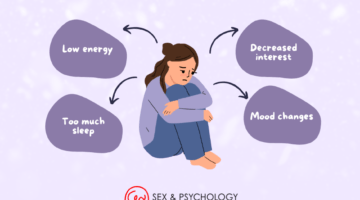How Do You “Come Out” as a Sex Therapist, Educator, or Researcher?
May 29, 2019 by Justin Lehmiller
Whenever someone asks what I do for a living, I have a decision to make: do I “out” myself as a sex scientist, or do I give a generic answer that doesn’t emphasize the fact that I study sex for a living? For example, I could simply say that I’m a social psychologist or an author and leave it at that. This choice is something that all sex educators, researchers, and therapists face. Each of us has to figure out on our own what we want to reveal about our jobs to different audiences. However, there’s one audience that’s often especially tricky to navigate: our families.
Based on conversations I’ve had with several of my friends and colleagues, some people in my field struggle with how to have conversations about their work with their family, especially those of us who come from politically or religiously conservative backgrounds. So how can you better navigate these situations? I asked some of my colleagues for their thoughts on this in a recent social media post—what have their experiences been like, and what advice would they like to share? Here’s what they told me.
Let me begin by saying that I noticed a wide spectrum in terms of how people’s parents reacted to learning that one of their kids was working in this field. Reactions ranged from shock and embarrassment to indifference to enthusiastic support. The fact that parents’ reactions are so highly variable is likely a big part of the reason people who work in this field are sometimes hesitant to come out to their families—you don’t necessarily know which response you’re going to get.
Something else I noticed is that people often encountered stereotypes when they identified themselves as sex educators/researchers/therapists. For example, one sex therapist told me that upon telling a parent what she does for a living, the reaction she got was “Were you always obsessed with sex and we just didn’t know it?” Another mentioned that her parents were under the impression that all sex therapists sleep with their clients.
Clearly, some folks believe that people who get into this field are inherently sex crazed (which, by the way, we aren’t—at least not any more than people in other fields. See here for some research refuting this stereotype). Some people also have some very, very wrong ideas about what it is that we actually do (we don’t sleep with our clients or research participants). So be prepared to run into stereotypes, and think about having a polite response on hand to correct them (e.g., “It’s not only unethical for sex therapists to sleep with their clients, but it’s forbidden by professional and state licensing boards. We help people confront and work through sex and relationship problems by talking about them.”).
As for starting the conversation, there isn’t one “right” or “correct” way to do this—different people find that different strategies work. So here are a few to consider:
· Dr. Shayna Sparling, a sex researcher, said that she “eased” her family members into it. “I started out telling them I study health decision making,” she said. “Then, a few years later told them that I research HIV and STI prevention. Then they started following me on Instagram, so now they know everything I do.” Shayna’s strategy is one that several of the folks I talked to mentioned, including therapist Heather McPherson, who said, “my advice is to take it slow. We have been considering and thinking about this for a while and this is the first time they are hearing about it. That can be a little shocking if you bombard them with all the sexy details.” | took the gradual approach as well—but it was easy for me because it mirrored my career path. I went to graduate school initially to study the psychology of romantic relationships. Then I started studying sex within relationships and why that’s important to the overall happiness and health of the partners. It wasn’t until much later that I started studying things like fantasies and threesomes. Because it was such a gradual evolution, it gave me a chance to ease my family into my work by keeping them in the loop about what I was doing at each step along the way.
· Sunny Megatron, a sex educator, said that she often emphasizes the importance of healthy relationships and finding happiness, as opposed to getting into nitty gritty detail about specific sexual practices. She said another approach she sometimes takes is to say that “people have shame and secrets about three major subjects: sex, death, and money. It’s healthier if we learn to address these things head-on, and I help facilitate one-third of that. If they’re squeamish about sex, oftentimes they can relate instead to the taboo nature of money or death.”
· Dr. Jim Pfaus, a sex scientist, told me how he tried to make the case for why his work is important to his mother, who was a little embarrassed at first when she learned about his job. “I brought a video home one X-mas break and showed her how rats do it and especially how it is in the complete control of the female. She was in a state of wonder,” he said. “And I explained how dopamine and opioid systems in the brain helped to regulate desire and pleasure, and how drugs or experiences that get in the way of the action of those systems could cause sexual problems. I think for the first time she truly began to understand the importance of what I was doing.” Jim said she later showed the video to some of her friends at a party, so it seems to have worked!
I should also mention that a few of my colleagues said that focusing on the technical details of research and data analysis helped them to “come out” because it made sex research sound rather, well, unsexy. Again, this gets back to refuting the stereotypes people have about us. For example, I think people sometimes assume that I just sit around and watch porn all day, but the reality is that, most days, I’m sitting at my desk with a statistical program open crunching numbers and writing in a Word document. It’s really not so sexy when you describe what a typical day is like for you, especially when it’s more about statistics and numbers than anything.
Ultimately, you need to figure out what approach or strategy is right for you, but hopefully this gives you some ideas to consider. If you have other advice to offer or experiences to share, use the comments section below to weigh in.
Want to learn more about Sex and Psychology ? Click here for previous articles or follow the blog on Facebook (facebook.com/psychologyofsex), Twitter (@JustinLehmiller), or Reddit (reddit.com/r/psychologyofsex) to receive updates. You can also follow Dr. Lehmiller on YouTube and Instagram.
Image Source: 123RF/Aleksandr Davydov
You Might Also Like:

Dr. Justin Lehmiller
Founder & Owner of Sex and PsychologyDr. Justin Lehmiller is a social psychologist and Research Fellow at The Kinsey Institute. He runs the Sex and Psychology blog and podcast and is author of the popular book Tell Me What You Want. Dr. Lehmiller is an award-winning educator, and a prolific researcher who has published more than 50 academic works.
Read full bio >


